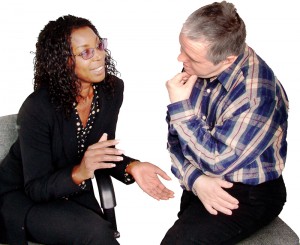
Background
Recent events have highlighted the increased risk of abuse faced by people with learning disabilities. Local authorities regularly collect data on adult protection referrals and one study has looked at trends that have emerged from analysis of this data
Last year, we posted about a study based on in-depth interviews focusing on the experience of people living independently in the community which suggested that perpetrators of abuse against people with learning disabilities living independently tended to be people in the locality, including neighbours, and often young people and schoolchildren.
A report based on a three year mixed methods study by researchers at the Tizard Centre in Kent suggested that nearly half the people with learning disabilities in their sample reported victimisation experiences.
The researchers in this study were interested in offering an opportunity for people with learning disabilities themselves to express their views.
They worked with people in Wales, looking particularly at what people themselves thought they needed keep safe. They also explored what support people thought they might need if they were abused.
Method
What they did was develop a questionnaire exploring the issues and distributed as a postal survey and also to people attending a residential research event.
They got back 107 questionnaires which were completed in a way that made them usable in the study.
Results

People reported having a trusted person who believed you as most important
What they found was that the respondents identified most strategies that had been raised for keeping safe as useful. However, they were more likely to identify personal strategies rather than actions to be taken by other people.When they looked at what was important for people when abuse did occur, they found that people said that having a trusted person to speak to and who believed were most important.
Conclusion
It was clear to the authors of the study that the questionnaires responses showed that people with learning disabilities were able to identify personal safety strategies.
They recommend that personal safety courses and staff training be influenced and informed by these views and experiences.
They conclude that a key component of any effective strategy to reduce abuse and respond appropriately requires the development of effective circles of support.
Links
Keeping Safe and Providing Support: A Participatory Survey About Abuse and People With Intellectual Disabilities, Northway R et al., in Journal of Policy and Practice in Intellectual Disabilities, 10: 236–244
Hampshire Police have created an easy read poster on how to contact the police
The BMA recently produced a toolkit for GPs, highlighting the obligation they have to protect vulnerable adults

“@WELDBlog: Effective circles of support recommended for success of strategies to reduce abuse http://t.co/vnPSvKitMO“
Effective circles of support recommended for success of strategies to reduce abuse in people… http://t.co/qcxzz6TExU
Bernie Mayall liked this on Facebook.
Nathalie Leyland liked this on Facebook.
RT @WELDBlog: Effective circles of support recommended for success of strategies to reduce abuse in p… http://t.co/zHDRLFuE4C
circles of support recommended for success of strategies to reduce abuse in people with learning disabilities http://t.co/ua2IvtkXZx
Cheryl Hillis liked this on Facebook.
Carole Shaer liked this on Facebook.